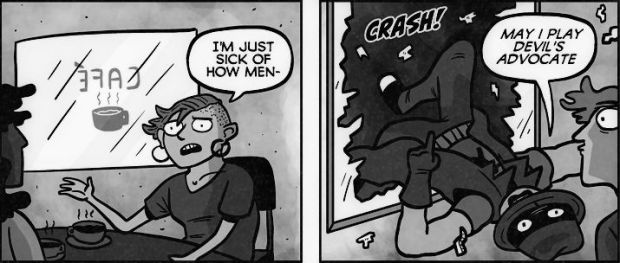
A funny story . . . er . . . right, sort of. Okay, not really.
Once upon a time, several years ago, a friend and I stopped by his tech-sector office late at night to grab a couple boozeless drinks from the staff fridge. And while the idea of people working late is hardly unusual in these United States, there were several people hunched over in their cubicles, clacking away at their keyboards, and they were apparently pushing for deadline. Such is the software sector.
There was a proper butch lesbian of larger bodily proportions and less contrived personal fashion—i.e., disqualified from the “hot” list—working out of the corner cubicle. Indeed, she is only important in the context of the rest of the anecdote.
There was nothing unusual about that night, but my friend commented on a story I had recently heard from a woman; he was the other player.
So it goes, for reasons that were never clear to me, a female friend had stopped by his office for something. Sure, that’s sort of a clue that something is up with the story, but there is nothing else on the other end to suggest why. Whatever, this was over a decade ago; I could easily have smoked away those memory cells.
Apparently the sight of a lithe blonde woman of chesticle endowment brought the office to a halt.
“They don’t see women very often,” my friend joked, and if you remember the alpha geek jokes from the time, well, that’s right on target. I did point out the lesbian in the corner cubicle, but got the, “Dude?” shrug in return: Nobody thinks of her as a “woman”. Dude.
And let that say what it will.
Dude? Dude.
It is naturally the first memory to mind as the “GamerGate” story penetrates my sphere of indifference toward the perpeutal juvenilia known as gamer culture.
And when I see a bunch of gamers panicking? Well, that just recalls the old alpha geek jokes.
For those unfamiliar, GamerGate is a pretty minor scandal. For those with a stake in its issues—in this case over half the American population, i.e., women, as well as software industry workers and executives—it is actually a sad repetition of roadworn attitudes reminding just how badly Americans have trashed the Shining City on the Hill.
Still, though, it is very nearly amusing to see the gamers panic.
Brief summaries should suffice to bring people up to speed. Stephen Totilo of Kotaku explains:
The current drama goes back, however directly or indirectly, to an ex-boyfriend and a series of blog posts attacking his ex-girlfriend’s character, then it goes to scrutiny and harassment, takes a turn to involve a possible game journalism sex scandal (refuted), maneuvers into vitriol against feminist game critic Anita Sarkeesian (horribly nasty stuff), takes another turn to be about journalism ethics (addressed), spills into some essays and round-ups about how fraught the marketing-driven “gamer” identity is and how it might be dying or dead (rounded up here on Kotaku in an article that says there are many a cool gamer, too!) and then in some way flows into a thing called GamerGate which was actually first used as a Twitter tag a day before any end-of-gamer articles were written.
Over at TechCrunch, Tadgh Kelly tries his hand at telling the story:
#gamergate began a few weeks ago when an ex-boyfriend of Zoe Quinn posted an enormous, pompous and self-important diatribe online accusing her of sleeping her way around the games industry. He posted screengrabs of chats they had, presented his side of the story as the noble and maligned man being led astray by this faerie creature who turned out to be full of lies and so on.
His revenge-porn/character-assassinating rant went all around the gaming world at the speed of rumor and was followed by hacks and “doxxing” activities that purported to show that gamers had been right to be suspicious about Quinn. In its wake a torrent of abuse and more abuse started to build a head of steam. Allegations of conspiracy, of women using sex to manipulate the industry and all the rest of it gained outsized publicity largely due to a video shared by actor Adam Baldwin. And then, somewhere around the same time, Anita Sarkeesian published her latest Tropes vs Women video and the waves of rage and accusations of agenda-pushing in the media began all over again.
And that’s the thing about stereotypes and legends, techies and the Dudehood. There’s nothing new, here. (more…)
![CSPAN (@cspan): ".@SenateMajLdr: 'We have hired a female assistant to go on staff and to ask these questions in a respectful and professional way. We want this hearing to be handled very professionally not a political sideshow...' #Kavanaugh" [via Twitter, 25 September 2018]](https://bdthisis.wordpress.com/wp-content/uploads/2018/09/cspan-20180925-tweet-mcconnell-femaleassistant-politicalsideshow-detail-bw.png?w=300&h=300) .@SenateMajLdr: “We have hired a female assistant to go on staff and to ask these questions in a respectful and professional way. We want this hearing to be handled very professionally not a political sideshow…” #Kavanaugh
.@SenateMajLdr: “We have hired a female assistant to go on staff and to ask these questions in a respectful and professional way. We want this hearing to be handled very professionally not a political sideshow…” #Kavanaugh




